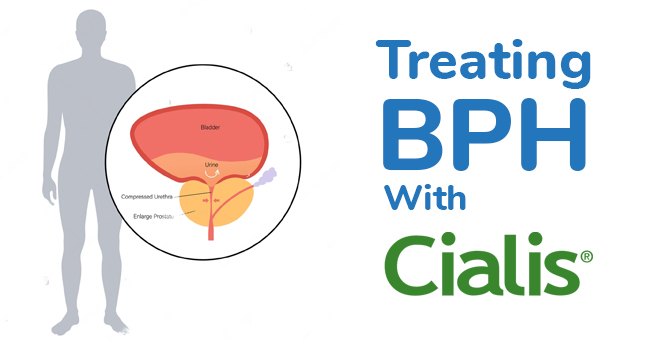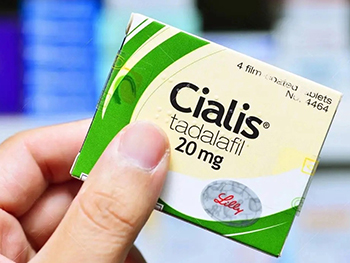The Bryn Mawr Urology Group - A Division of Academic Urology | 919 Conestoga Road Rosemont, Pa 19010
Cialis for Treating Benign Prostatic Hyperplasia

💊 Curious if Cialis is Right for You? Take the 60-Second Check
Answer 3 quick questions to see if you may benefit from a safe, doctor-backed consultation.
Benign prostatic hyperplasia (BPH) is quite widespread. Many researchers talk about the inevitability of this disease in older men. The prostate gland is a small organ, the size of a walnut, which is found exclusively in men. It is located below the bladder, the urethra passes through it, and it also produces a secret that is thrown out during ejaculation. With time, hyperplasia can develop in this organ. This is a completely benign formation. However, it has a tendency to increase.
What is benign prostatic hyperplasia?
This is a progressive disease characterized by an enlarged prostate and accompanied by urinary disorders. 75% of men over the age of 50 years old have symptoms of BPH. The progression of this disease is manifested in deterioration in the quality of life, increased urination disorders, and an increased risk of urinary retention.
Common sexual problems for men with BPH are erectile dysfunction, problems with ejaculation, absence of ejaculation, or, less commonly, low libido. In addition, men may notice a lack of energy and fatigue.
What causes BPH?
International studies show that 72% of men with urination disorders caused by the BPH consider it important for them to have a sexual life. It has been shown that symptomatic forms of BPH affect the quality of life of patients while patients consider sexual activity to be one of the main components of this parameter.
As a man gets older, there is a decrease in sexual function, which includes not only sexual desire but also erectile function, as well as the sensitivity of the penis. The frequency of sexual intercourse decreases on average from 1 time per week at the age of 65 years to 1 time per two months at the age of 80 years. 50% of men between 40 and 70 years old suffer from sexual dysfunction.
Not so long ago, it was believed that ED was not associated with urinary disorders. However, there is data indicating the occurrence and/or progression of ED due to the urination disorders associated with BPH in men. Recent studies show a significant positive correlation between ED and urinary disorders. According to the data, with urinary disorders in men with BPH, the risk of developing ED was 40% higher.
Symptoms of BPH
The severity of symptoms in men suffering from BPH may vary, but, as a rule, symptoms tend to increase over time. The most common symptoms of BPH are:
- Frequent urination at night (nocturia)
- Increased or sharp urge to urinate
- Urine stream is weak or stops
- Leakage of urine at the end of urination
- Prostate or bladder cancer
- Damage to the nerves that control the bladder
- Presence of stones in the kidneys or bladder
- Urinary tract infections
- Inflammation of the prostatitis.
How to Treat BPH?
Fortunately, effective treatment of the prostate can help eliminate some problems of the sexual sphere such as ejaculatory disorders, fatigue, and lack of energy.
The goal of treating patients with BPH is to reduce the severity of urination disorders, improve the quality of life, prevent the development of complications, and the need for surgical treatment.
The great achievements of recent years have been the possibility of conducting fundamental scientific research on the study of the main mechanisms of the pathogenesis of BPH and the development of effective drugs based on the results of these studies – 5α-reductase inhibitors and α1-adrenergic blockers, which have made it possible to change approaches to the treatment of BPH, significantly improving the possibilities of conservative therapy for this disease.
One of these inhibitors Tadalafil has been approved by the FDA for treating BPH.
Mechanism of Action of Cialis (Tadalafil)
Phosphodiesterase type 5 inhibitors are the first-line drugs in the treatment of BPH. The mechanism of action of these drugs is associated with the effect on the system that controls the intracellular concentration of cyclic guanosine monophosphate. Cialis is the best medication for patients with mild to moderate BPH.
Benefits of Cialis
 Studies have shown that Cialis to a greater extent increases the confidence of patients in their ability to have sexual intercourse, the spontaneity of sexual life, and also reduces the degree of anxiety about the time that has passed since taking the drug. At the same time, two-thirds of patients noted the possibility of achieving an erection after a considerable time after taking it, which is preferable for elderly patients, as the main advantage of Tadalafil, which made them choose this particular drug. This fact created in patients a feeling of naturalness in sexual life.
Studies have shown that Cialis to a greater extent increases the confidence of patients in their ability to have sexual intercourse, the spontaneity of sexual life, and also reduces the degree of anxiety about the time that has passed since taking the drug. At the same time, two-thirds of patients noted the possibility of achieving an erection after a considerable time after taking it, which is preferable for elderly patients, as the main advantage of Tadalafil, which made them choose this particular drug. This fact created in patients a feeling of naturalness in sexual life.
The 12-week study included 1,054 men with urinary disorders due to BPH, they were randomized to receive placebo and Tadalafil at various dosages (2.5–20 mg). The results were assessed using IIEF-5 and IPSS. It was found that by improving IIEF, Tadalafil significantly reduced the severity of urination disorders.
Dosage of Cialis
For daily usage, the recommended dose of the medication for treating elderly patients with benign prostatic hyperplasia is 5 mg per day, regardless of food intake. The medication acts for 36 hours. The effect appears already 16 minutes after taking the dose in the presence of sexual arousal.
Adverse Effects
Undesirable effects, which are observed most often in the treatment of BPH, are headache, back pain, myalgia, dyspepsia, the frequency of which is associated with the increase in the dose of Tadalafil. Adverse effects are short-term, from mild to moderate.
Tabular data on adverse effects
The following table contains data on adverse effects, information about which came from spontaneous reports and which were received during placebo-controlled clinical trials with daily use of Cialis while treating BPH.
| Very often | Often | Infrequently | Rarely |
| Cardiac disorders | |||
| Tachycardia, palpitations | Unstable angina, myocardial infarction, ventricular arrhythmia, | ||
| Nervous System Disorders | |||
| Headache | Dizziness | Convulsions, migraine, cerebrovascular accident, transient amnesia | |
| Immune System Disorders | |||
| Hypersensitivity reactions | Angioedema | ||
| Hearing and balance disorders | |||
| Ringing in the ears | |||
| Vascular disorders | |||
| Hot flushes | Arterial hypotension | ||
| Respiratory system disorders | |||
| Nasal congestion | Dyspnea, epistaxis | ||
| Gastrointestinal disorders | |||
| Dyspepsia, gastroesophageal reflux | Abdominal pain | ||
| Skin and subcutaneous tissue disorders | |||
| Rash, hyperhidrosis | Exfoliative dermatitis | ||
| Renal and urinary disorders | |||
| Hematuria | |||
| Reproductive system disorders | |||
| Bleeding from the penis, hemospermia | Prolonged erection | ||
| General disorders and condition at the injection site | |||
| Chest pain | Sudden cardiac death, swelling of the face | ||
Frequently Asked Questions
Does Cialis help with urination?
Yes. Cialis (Tadalafil) is FDA-approved for treating lower urinary tract symptoms associated with benign prostatic hyperplasia (BPH). It works by relaxing the smooth muscles in the prostate and bladder, which reduces pressure on the urethra. As a result, men often experience easier urination, a stronger urine stream, and fewer interruptions during the day and night.
How long does it take for Cialis 5mg to work for BPH?
While some men may notice symptom relief within a few days, most patients begin to see significant improvements in urinary symptoms after two to four weeks of consistent daily use. Clinical trials have shown that the full benefits of Cialis for BPH are typically observed around the 4 to 6-week mark. It’s important to take the medication daily and as prescribed by a healthcare provider for best results.
Can Cialis shrink the prostate?
No. Cialis does not reduce the actual size of the prostate gland. Instead, it improves symptoms by relaxing the muscles around the prostate and bladder neck. For patients seeking to shrink the prostate, 5-alpha reductase inhibitors (like finasteride or dutasteride) may be prescribed. However, Cialis provides faster relief of urinary symptoms without hormonal changes or sexual side effects typically associated with those medications.
Does Cialis help with frequent urination?
Yes. By improving bladder emptying and reducing irritation in the lower urinary tract, Cialis can reduce the urge to urinate frequently—especially at night (a symptom known as nocturia). Many patients report fewer nighttime bathroom trips and improved sleep quality after several weeks of treatment with daily 5 mg Cialis.
Can Cialis be taken with other prostate medications?
In many cases, yes. Cialis is often used alongside other medications for BPH, such as alpha-blockers (e.g., tamsulosin) or 5-alpha-reductase inhibitors (e.g., finasteride). However, combining Cialis with alpha-blockers should be done cautiously and under medical supervision, as the combination can lead to a drop in blood pressure. Always consult your doctor before combining treatments.
Does Cialis affect testosterone or PSA levels?
Cialis does not directly impact testosterone production or PSA (prostate-specific antigen) levels. Its mechanism of action focuses on relaxing smooth muscle tissue in the lower urinary tract. However, by improving sexual function and reducing urinary symptoms, some patients report an improved sense of well-being, which can indirectly benefit hormonal balance. PSA levels should still be monitored separately for prostate cancer screening.
Summary
Many patients with benign prostatic hyperplasia (BPH) also experience sexual dysfunction. The inclusion of Cialis (Tadalafil) in their treatment plan helps address both problems — improving urinary symptoms and restoring erectile function.
Clinical studies support the effectiveness of a Cialis daily 5 mg dose, showing improvements in symptom severity, sexual health, and overall quality of life in men with BPH. To learn more about the safety and legal aspects of buying Cialis online, read our doctor-reviewed guide here.

